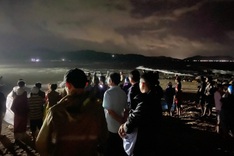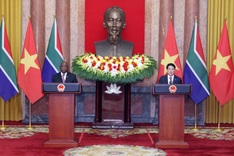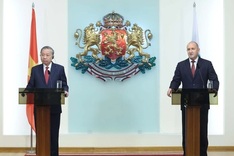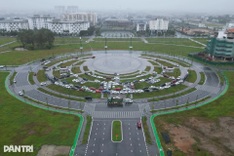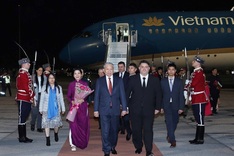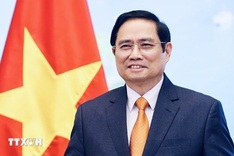People’s Artist Tran Binh, director of the Central Song and Dance Theatre, has asked the Ministry of Culture, Sports and Tourism’s permission to open a copyright protection center, the second of its kind in Vietnam.
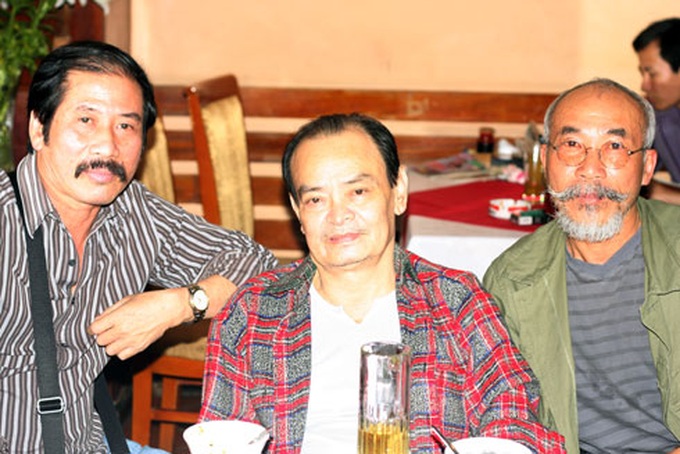
Artist Tran Binh (first from left)
The first is the Vietnam Centre for Protection of Music Copyright (VCPMC), with composer Pho Duc Phuong as its director.
Tran Binh said that he and some composers did not agree with the VCPMC’s working style. This center collects royalty based on the number of seats but it does not have a common formula for calculating royalty.
“Composer Pho Duc Phuong collected VND4 million (USD200) per a song from the shows organized at the nearly 4,000-seat National Convention Centre (Hanoi), VND3.6 million per song from the shows held at the 500-seat Hanoi Opera House. He reduced the royalty to VND2 million (USD100) per song when show organizers entreated. Sometimes he collected VND700,000 or only VND300,000/song. That working style raises difficulty for both show organizers and composers,” Tran Binh commented.
The VCPMC’s director, composer Pho Duc Phuong, said that “stars” received huge payment for singing several songs in a show while composers receive a little. However, People’s Artist Tran Binh said that there are only several “stars” in Vietnam. “Nearly 10,000 singers and dancers are living at poverty. A famous singer like Phuong Thao was paid VND150,000 ($7) for performing in my theatre’s show. It is unacceptable to pay millions of dong of music royalty,” Binh added.
People’s Artist Tran Binh and some famous composers like Phu Quang and Quoc Trung also did not agree with the way the VCPMC pays royalty to composers.
“Phuong’s center collects from television stations VND100,000 per song, VND50,000/song if it is aired the second time and VND300,000/song for shows that have sponsors. They have collected royalty from TV stations for years but they have not paid royalty to composers because they said that there is not an appropriate royalty sharing mechanism yet,” Tran Binh said.
This center refused to show proxies of composers to show organizers. Composer Tu Nhi said that he had not authorized the center to collect royalty of his songs but it has had collect royalty from show organizers and has not paid royalty to him yet.
People’s Artist Tran Binh said that his theatre always paid royalty directly to composers because “it is easier to working with composers than with VCPMC.”
Tran Binh, with the support of many composers, has decided to ask the Ministry of Culture, Sports and Tourism to open a new copyright protection centre.
According to him, the new center will not only collect music royalty but also royalty of dances, dramas, installation art, etc. This center will apply the Singaporean model: collecting royalty based on the scale of shows and the nature of shows (shows held by firms for commercial purpose, shows on state radio and TV channels, shows of state-owned companies to serve the public).
Besides learning from Singapore, collecting royalty will be suitable with Vietnam’s situation, Binh said.
“The royalty of a work that was launched 20-30 years ago must be lower than a newly-launched work because composers of the previous generations were trained by the state so their works must serve the public. Royalty is for encouragement only. Young composers have to train themselves so their works must have higher royalty in the early years,” he added.
Binh said that his center would pay royalty to composers on a monthly basis, not quarterly basis as the VCPMC. The center will keep up to 10 percent of royalty. However, the plan must have the Ministry of Finance’s approval.
According to a representative of the Performing Arts Agency, the establishment of a new copyright protection center is possible because such centers are private firms. The more such centers are set up, the more choices for composers and the fight against copyright infringement will be strengthened.
Meanwhile, the Ministry of Culture, Sports and Tourism’s spokesperson To Van Dong said that it is legal for artists to open copyright protection centers but this task is not simple. Such a center is established with the permission of the three agencies: the Ministry of Home Affairs, Ministry of Culture, Sports and Tourism and the Ministry of Finance.
Dong added that the government had assigned his ministry to develop a plan on assisting the operations of non-governmental organisations like the VCPMC.
Tran Binh is very confident with his plan. He said that the documentations will be submitted to the three related ministries so the new copyright centers will be opened this year’s end.


